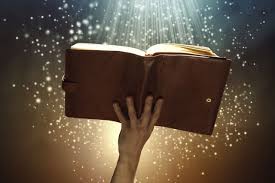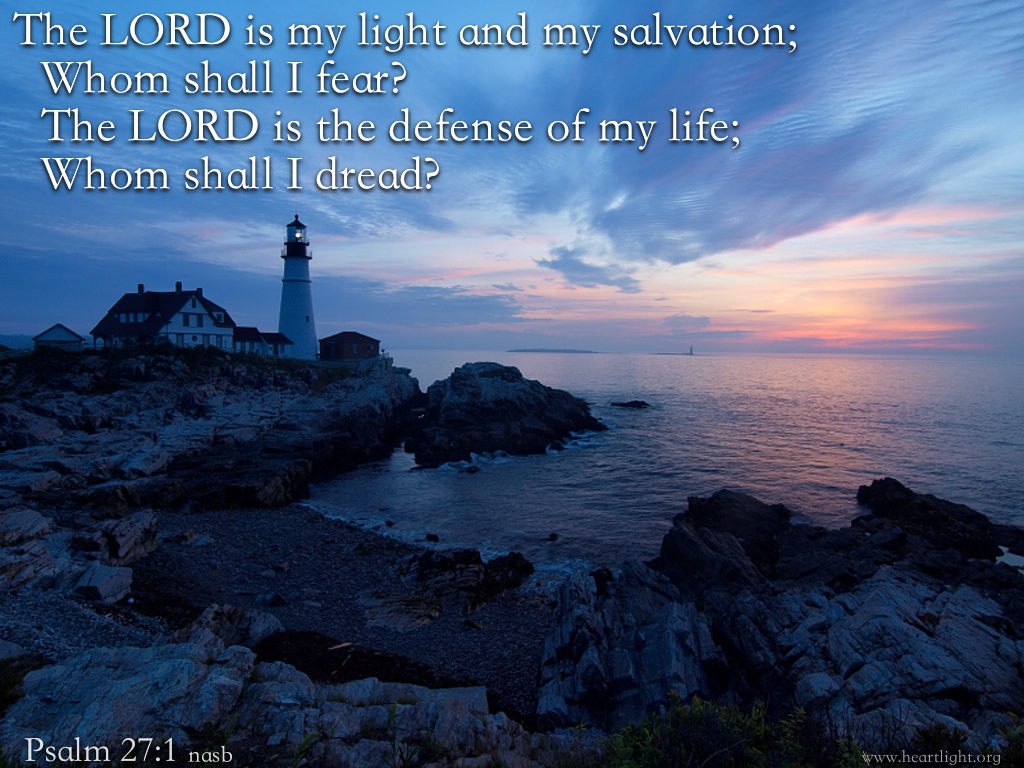
...............................................................................................................................................................
A Reflection on
Psalm 27
 we still sin, and we
still die, and we will still be afraid, but the power has gone out of them - Jesus
took them all to the cross with him, and there they died with Him - the real
power in the world is the power of the living God, that we are called to live
out of day by day, even in those fearful times when we can’t see it or feel it
we still sin, and we
still die, and we will still be afraid, but the power has gone out of them - Jesus
took them all to the cross with him, and there they died with Him - the real
power in the world is the power of the living God, that we are called to live
out of day by day, even in those fearful times when we can’t see it or feel it
by richardlfloyd
“The Lord is my light and my salvation; whom shall I fear?” - Psalm 27:1-2
It’s a good question?
Whom shall I fear?
Of whom (or what) shall I be afraid?
And I really like this, because I believe
that faith lives in the midst of our fears.
John
Calvin writes about this passage: “When David declares, ‘My heart shall not
fear,’ this does not imply that he would be entirely devoid of fear, — for that
would have been more worthy of the name of insensibility than of virtue.”
In other words, David had every right be
afraid of the army encamped about him. Imagine it.
He sees their campfires every night, he can
hear their trumpets, and he knows they can attack him at any time. I’d be
afraid, too.
And
Calvin goes on to say: “Under the terms, camps and armies, [David] includes
whatever is most formidable in the world.”
So
though the names and faces of the powerful people and things who hold the world
in thrall will change, the truth of the Psalm remains: “Although all men
should conspire for my destruction, I will disregard their violence, because
the power of God, which I know is on my side, is far above theirs.”
The Good News here is that the principalities
and powers of this age, and any age, are ultimately subordinate to the power of
God, though as the rest of Psalm 27 amply shows, they manage through their
subordinates (in this case “the army encamped about David”) to give both
David and, with the necessary changes, us, plenty about which to be afraid, at
least in the short run.
No, the fears are quite real.
So.
faith always lives in the midst of our fears, but it is that same faith that
knows “when the trial comes, our faith will prove invincible, because it
relies on the power of God.”
And the final power of God will finally be
made manifest in weakness, on a Roman cross. This Jesus knows, and this is why
he must go to Jerusalem.
So, there are two kinds of fears, and they are
quite different, though it is often hard to distinguish between them, because
they get all wrapped up in each other.
First, there are the real fears, as when David
has an enemy encamped around him, or when you are in the midst of a pandemic.
These are real fears.
But there is also a kind of fear that is not
real. It holds some kind of power over us, and it is not attached to a specific
threat.
This kind of generalized fear is not good for
us.
It makes us less than who God wants us to be.
It robs us of dignity and courage, and makes us act in ways that are not worthy
of us.
And I am convinced that some of the nastiness
in our public discourse right now is based on exactly that kind of fear.
What we are going through is something that
none of us have ever known in our lifetime.
It has stirred up a lot of the second kind of
fear, the unnamed and unknown fears about our future, and the future of our
country.
It is true that there are real things to fear
from it, not only about becoming infected, but real fears about losing our jobs
or our homes or our pensions. That is real fear.
But the second kind is different; the general
pervasive kind of fear that takes on a larger life of its own.
It begins to eat us up, and attaches itself to
every part of life. I call it “4 o’clock in the morning fear.”
Do you know what I am talking about?
Do you know that kind of fear? I suspect you
do.
I know I do. I know it all too well. And there
is just enough reality in our fears to give them some credibility, but their
power over us is larger than they deserve.
And I know that these are the kind of fears
that can debilitate one’s life, and in some real way, they are the very
opposite of faith, and so they must be dealt with.
So here we are in Lent, the season of
self-examination and repentance.
My Lenten admonition to you all is to figure
out those fears that keep you from being who God has made you to be.
Identify them, name them, and call their
bluff, because they really have no actual power over you that you don’t give
them.
That is the Good News on which we can stand
secure.
Oh, we still sin, and we still die, and we
will still be afraid, but the power has gone out of them.
Because Jesus took them all to the cross with
him, and there they died with him. And believing that is a good part of what
makes us Christians.
For the real power in the world is the power
of the living God, that we are called to live out of day by day, even in those
fearful times when we can’t see it or feel it.
“The
LORD is my light and my salvation, whom shall I fear?
The
LORD is the stronghold of my life; of whom shall I be afraid?”
Amen.
(This is excerpted and adapted from a sermon entitled “Whom Shall I Fear?” that
I preached at Charlemont Federated Church, Charlemont, MA, on February 27,
2010. Photo: “Onota Lake” by R.L. Floyd.)
I am an ordained minister, author, writer and blogger, living on
the edge of a marsh (see header pic) in the Berkshire Hills of Western
Massachusetts with my wife Martha.
I am Pastor Emeritus of First Church of Christ in Pittsfield,
Massachusetts, where I served for 22 years. Before that I served congregations
in Maine and was a seminary chaplain.
“When I Survey . . .” contains some of my ruminations on a
variety of topics, including, but not limited to, theology, pastoral ministry,
the church, ecumenism, cooking, food and wine, the arts, books, films, music,
poetry, politics, traumatic brain injury, New England Sports teams, memories,
and the occasional rant.
I have also archived here many of my published and unpublished
essays, book reviews, hymns, devotions, special-occasion sermons, papers and
addresses from my four decades as a pastor-theologian. Glad you found me. Take
a look around and come back anytime.


No comments:
Post a Comment